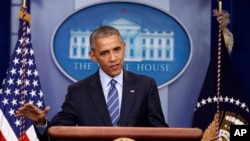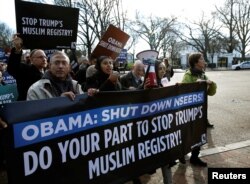The Obama administration said Thursday it is officially scrapping a post-9/11 requirement for immigrant men from predominantly Muslim countries to register with the federal government.
The decision to end the National Security Entry-Exit Registration System, or NSEERs, comes amid growing international terror fears and suggestions from President-elect Donald Trump that he could ban Muslim immigrants from the United States.
The U.S. hasn't been using the program since 2011, but a top immigration adviser to Trump has spoken of renewing it.
After a truck attack killed 12 in a Christmas market in Berlin earlier this week, Trump said Wednesday that the violent attacks prove he is right about his plans to institute tough screening of Muslims attempting to enter the United States after he assumes power next month.
"You know my plans. All along, I've been proven to be right. 100 percent correct. What's happening is disgraceful," Trump said Wednesday in a brief exchange with reporters in Florida, where he was continuing to interview candidates to fill key positions in his administration.
September 11 terror attacks
The registration system launched about a year after the September 11 terrorist attacks, requiring men and boys from a variety of mostly Middle Eastern countries to register with the federal government upon their arrival in the United States. Such people already in the country had to register with immigration authorities inside the U.S.
Registration, which also applied to immigrants from North Korea, included fingerprints and photographs. People also were required to notify the government if they changed addresses.
The Obama administration will publish its decision in the Federal Register on Friday, and it will become effective immediately. The program had been widely derided by civil libertarians as an effort to profile people based on their race and religion.
The program is "not only obsolete," said Neema Hakim, spokeswoman for the Homeland Security Department, "its use would divert limited personnel and resources from more effective measures."
The recently appointed White House counselor Kellyanne Conway spoke about the issue on various morning news shows Thursday.
Conway denied on CNN that Trump still supports a ban on Muslims, describing his plans as focusing on country-specific vetting rather than solely on religious affiliation, according to The Washington Post.
She urged Fox News viewers to visit Trump's website to view his plan to create a commission to "identify and explain to the American public the core convictions and beliefs of radical Islam," establish new screening procedures, and suspend immigration from "volatile regions of the world," the Business Insider reported.
"We need better vetting policies in these countries that train, harbor and export terrorists," Conway said, according to the business online website.
Last month, Kansas Secretary of State Kris Kobach, a Trump immigration adviser during the campaign, said Trump should renew the program.
NSEERS reboot
Meeting with Trump in New York, Kobach carried a document labeled "Department of Homeland Security Kobach Strategic Plan for First 365 Days." It listed an NSEERS reboot as the top priority. The document was visible in a photograph by The Associated Press.
On Thursday, Kobach told the Independent the policies could be enacted by bringing back the NSEERS system the Obama team is now scrapping.
The list suggested the U.S. government "update and reintroduce" the program for all foreigners from "high-risk" areas.
Trump has also not publicly listed which countries may be subject to his possible travel ban or enhanced vetting.
Previously, a number of prominent tech companies, including Facebook, Twitter and Apple, said they would not help the incoming Trump administration build a Muslim registry.
More than 2,500 employees at dozens of technology companies also signed an online pledge vowing not to help Trump build a data registry to track people based on their religion or assist in mass deportations.
Some material for this report came from AP and Reuters.






